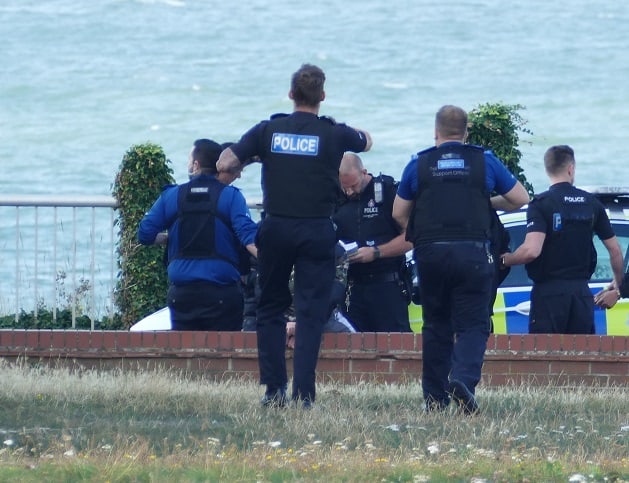
Dedicated police officers will be allocated to Thanet schools as part of a scheme running across Kent and Medway.
Schools officers are expected to be in place at least some county sites by this June and will support students, teachers, parents and communities in the” identification and disruption of criminality and exploitation.”
According to a Kent Police internal engagement document “Service provision has been kept simple and split simply between primary and secondary+ age groups. This secondary+ age group includes secondary, further and higher education.”
Although primary schools have been mentioned in the document it is understood the current programme is to be focused on secondary schools, specialist schools and pupil referral units with Deputy Chief Constable Tony Blaker saying he expects most of these venues to have dedicated officers by early 2022.
The scheme will be rolled out across Kent and Medway between June 2021 – January 2022.
What will they do?
There will be a named Schools Officer contact who will potentially be working across several schools.
Officers will work shifts across 7 days a week, including school holidays, and “will work both inside and outside of the educational environment, depending on the focus and areas of priority.”
Amongst other duties schools officers will identify and work with groups of young people at risk of becoming victims, offenders or those that might be subject to radicalisation or exploitation.
They will also work closely with school staff to identify those that are vulnerable to serious violence, gangs, exploitation and county lines involvement.
County Lines drug gangs have targeted youngsters in Thanet. Youngsters are used to transport drugs and weapons and there were also incidents of trafficking. A specialist girls’ worker was employed by the St Giles Trust for its County Lines project in Thanet, Dover and, more recently, Canterbury, following an £800,000 award to enable the scheme to continue until Spring 2022.
Deputy Chief Constable Tony Blaker says other issues will include bullying, assaults and incidents of children being asked to put money through their bank accounts.
On BBC Radio Kent he said: “There’s lots of crime that young people experience and often they do not tell us about it so being their officer around their school, we will get to hear about it and we can tackle it.”
The teams
The schools officer team will have a lead Inspector at county level and then, for East Kent, there will be two Police Sergeants overseeing a team of 23 Police constables. Of these seven PCs will cover Thanet schools.
For all of Kent and Medway there will be the lead Inspector, six sergeants and 70 PCs plus a schools performance co-ordinator.
Resources have been allocated taking into account factors including the number of crimes and incidents, number of secondary schools, deprivation indicators and number of pupils. Thanet has been allocated the highest number of PCs in Kent – excluding Medway- with most other areas having three, four or five officers.
A leaflet sent to parents with youngsters at St George’s school in Broadstairs lays out what the role is for officers at secondary level and how they will work.
Schools Officers will:
Support Schools in delivering diversion and intervention schemes for vulnerable children
Act as a point of contact for teachers, parents and children in need
Actively safeguard children at risk of criminality or exploitation
Be there for our children and young people to talk to and seek advice from
The officers will not replace Schools Behaviour Policy and the “intention is not to arrest children in schools.”
The leaflet also tells parents/carers that each secondary school will have a named officer as core liaison
Officers will maintain regular contact with headteachers and respond to school requests,
They will support teachers in developing content for PSHE lessons to ensure a consistent and appropriate crime and policing message and will work alongside community based officers and education partners.
There will also be support for schools with reported incidents, signposting to or delivering early intervention and awareness inputs for young people and supporting children in recognising signs of danger and harm and how to report them.
Investing officers in educational settings
A Kent Police document explaining the plans says: “As part of the Uplift Programme, we are in the position to invest police posts in a variety of roles across the force. Chief Officers have selected some areas of initial focus for these posts, including enhancing the provision we currently have around schools, youth activities and other educational settings across the county.
“An investment in police officers dedicated to working within these environments, will complement the work our PCSO Youth Engagement Officers (YEOs) and others are already undertaking with colleagues working in the educational environment.
“By investing officers in our educational settings, we aim to ensure young people feel safer in their environments and, through positive dealings with them, prevent them from becoming victims of crime, or exploitation.
“We would also aim to divert children and young people away from the criminal justice system, prevent offending and address the causes of re-offending.
“During our design for this provision, we have worked closely with key stakeholders and practitioners, both internally and externally, to understand the benefit this police officer role will have, and how it can work best with those that are most closely impacted by such a role.
“It is not our intention to criminalise young people by introducing this role – the intention is to improve the lives of young people, make them feel safer, add value from our role in contextual safeguarding, and work with those vulnerable to exploitation.
“Schools Officers will work with primary and secondary schools, colleges, universities, pupil referral units, specialist schools and other educational establishments as appropriately defined. The intention is not a provision solely intended for schools and will also look at youth activities such as clubs that might be relevant or of focus to specific challenges and cohorts of students.”

